DIGITAL COUP QUARTERLY ( May 2023 to July 2023 )
- Myanmar Internet Project
- Dec 14, 2023
- 8 min read
Updated: Jun 26, 2025
It has been two and a half years since the coup. Using various methods, the junta coup council has brutally cracked down on people’s demands to restore democracy within this period. Digital oppression is among the excessive forms of suppression encountered throughout the coup period.
Within the past three months, the junta council has started preparing for the collection of data for household registration and collection of biometric data as part of their digital oppression measures, alongside internet shutdowns, the loss of freedom of expression for news media outlets via online platforms, and declining media freedom.
This article summarises the digital oppression incidents that occurred between May 2023 to July 2023.
Summary of digital oppression issues in May 2023
Junta’s preparation for population data and census household registration collection
Shutdown of mobile phone and internet connections along with interception
Steep decline of freedom of expression and media freedom
Junta’s Preparation for Population Data and Census Household Registration Collection
The military council announced that it will collect household registration data starting October 1, 2024. The military council-appointed Department of Immigration and Population announced that it will use tablets and computer software while collecting the household registration data and will invite international experts for the process.
Civil society organisations have pointed out that the military council’s plan of collecting population data will face difficulties as the country is facing internal conflicts and a lack of internet access. Additionally, as the military council has continuously oppressed the digital environment since the coup, the digital data that will be collected by the military council from the household registration will be used for surveillance of the opposition forces.
Nationwide census data collection has been done since April 2014 in Myanmar.
Shutdown of mobile phone and internet connections along with interception
The military council has repeatedly shut down the internet and mobile phone connections throughout the coup period to restrict people’s communication. There were also multiple shutdowns during May 2023.
MPT phone lines were cut off in Min Kin town starting May 3, 2023. MPT internet lines were cut off and other operations experienced difficulties in Monywa town of Sagaing region starting at 4 pm on May 9, 2023.
Due to the internet shutdown by the military council, residents of Chin State did not receive timely statements and information regarding the Mocha cyclone.
ATOM Telecom (which bought the former Telenor Myanmar) sent SMS advising its customers to register their SIM cards by including the information of the ATOM digital stores nearest to the customers. These messages prove that it is easy to know the location of the mobile users.
SMS for SIM card registration,
which includes the address of the nearest digital store for mobile users.
After analysing the situation from a technical perspective, SIM card locations can be identified whether or not mobile users switched on their GPS location or not. As your SIM card needs to connect to the nearest tower for usage, the location of the mobile users can be found through this process. This is a very alarming situation for the security of mobile users.
Steep decline of freedom of expression and media freedom
Myanmar’s media freedom and freedom of expression have been desperately on the decline since the coup. According to the media freedom index by Reporters Without Borders (RSF), Myanmar is 173rd out of 180 countries in the world, proving the above statement.
Besides the decline of media freedom, individual freedom of expression has been declining as well. A youth hip-hop singer who criticised the lack of electricity supply situation after the coup online was arrested on May 24. Due to those arrests by the military council, social media users have lost freedom of expression and they need to practise self-censorship.
Summary of digital oppression issues in June 2023
Shutdown of mobile phone and internet connection
Junta’s oppression of freedom of expression and media freedom
Junta’s preparation for the collection of biometric data
Shutdown of mobile phone and internet connection
The military council has imposed several kinds of internet shutdowns to oppress opposition democracy activists and halt the flow of news information since the coup. The same activities can be seen in June.
Mobile phone lines and internet connections were cut off in the villages and outskirts of Loikaw in Kareeni (Kayah) state since the morning of June 27. MPT mobile phone shutdowns in Min Kin, which were in place since May 3, have continued this June.
Junta’s oppression of freedom of expression and media freedom
The junta has conducted more distinct oppression of freedom of expression and media freedom in June 2023. On June 10, the military council stripped the Ayeyarwaddy Times news agency of its business license. The total number of people arrested for opposing the junta through their online posts was 50 within one week, from June 14 to 21, according to the military’s announcement. According to RFA’s data based on the announcements of the military, at least 1,050 people were arrested for writing and sharing posts that oppose the military on social media networks such as Facebook, TikTok and Telegram channels.
The military council does not only restrict freedom of expression but also controls the people’s financial flow. It has shut down more than 700 mobile banking accounts within May. These shutdowns were not only politically motivated but also included ordinary businessmen. Governments from Myanmar and Southeast Asia, as well as some organisations, have become more controlling and surveilling opposition groups using internet online techniques, according to a statement by the United Nations.
The military council is also pressuring people to register their SIM cards. Due to these pressures, users have had to register their SIMs and yet the telecoms still repeatedly send out SMS urging them to register again. Banks have also sent out these messages to users.
Junta’s preparation for the collection of biometric data
Data collections were implemented in the townships within Naypyitaw council, with the reason being the issuance of electronic ID cards since April 2023. On June 12, training for biometric data collection was held by the immigration department of the Bago division, according to state media.
Biometric data are biological measurements or physical characteristics that are computerised for use in identifying individuals.
Summary of digital oppression issues in July 2023
Continued efforts for biometric data collection
Shutdown of mobile phone and internet connection
Continued pressure for mobile SIM card registration
Junta’s oppression of freedom of expression and media freedom
Continued efforts for biometric data collection
In July, the collection of biometric data from citizens accelerated significantly.
On July 1, the immigration department from Kyunsu township of Tanintharyi region collected biometric data from the government staff.
The junta’s state media report on collecting biometric data at Kyunsu township of Tanintharyi region.
On July 3, biometric data was collected from government staff in Naungcho township of northern Shan state.
The junta’s state media report on collecting biometric data at Naungcho township of northern Shan state.
On July 6, biometric data was collected from the university staff including professors and deputy professors from Taungoo University of Taungoo township, Bago region.
On July 14, biometric data was collected from individuals in Myeik town using enrollment devices, and unique IDs with QR codes were issued. According to the state media announcement on July 15, more than 900 unique IDs were issued. Myanmar refugees in Mizoram were also undergoing the biometric data collection process by the Mizoram authorities and civil society organisations.
On July 18, biometric data was collected from government staff and family members in the Paung township of Mon state.
On July 21, biographic and biometric data were collected from individual citizens in northern New Dagon township, Yangon region, according to state media MRTV.
The junta’s state media report on collecting biometric data at northern new Dagon township, Yangon.
On July 24, 2,400 people were issued unique IDs after the collection of biometric data in Naung Oo township, Mandalay region, according to the media announcement.
Upon analysing the ongoing biometric data collection process, it becomes evident that nationwide biometric data collection is being carried out hastily. As the military council cannot provide accurate information regarding the election process, this biometric data collection process can be used to monitor citizens’ activities. More severe surveillance can be expected once the biometric data collection process has been completed.
Shutdown of mobile phone and internet connection
According to a Mekhong news report on July 3, mobile phone lines and internet connections have been shut down at Mobye since June 28 and a military offensive has been conducted. Starting July 5, MPT phone lines were cut down and fibre wifi internet lines were unusable in townships including Monywa in Sagaing region.
At 2 am on July 6, ATOM and Oredoo phone lines were cut down and only the military’s operation MPT was usable in Karenni (Kayah) state, according to Myanmar Press Photo agency’s report. Starting from the morning of July 11, Oreddo and ATOM phone lines were cut down in Kale town.
More than 50 townships in Myanmar were cut off from internet and phone lines for more than one year, according to VOA’s report.
The townships in Sagaing region, as well as those in Mobye, Kareeni (Kayah) state where internet and mobile phone lines were shut down, are the regions experiencing the military’s offensive attacks. It has been found that the military shuts down the internet and mobile phone lines in regions where they are going to conduct an offensive attack.
Continued pressure for mobile SIM card registration
The military council is using mobile phone lines and internet communication as a weapon and also restricting SIM card registration. If the phone SIM cards are not registered within three months, they will be shut down according to the announcement of the military council on July 5. This is a repeat announcement following their previous announcement to register by January 31, 2023. The military-controlled immigration department also announced that SIM cards that are registered with wrong information will need to be registered again within 30 to 90 days.
Junta’s oppression of freedom of expression and media freedom
The military council is severely restricting the flow of news information as well as oppressing the media freedom and freedom of expression of citizens.
The military’s information ministry announced on July 8 that they are preparing to file a lawsuit against DVB and Mizzima at the eastern district court in Yangon region due to remaining debt. Those two news organisations have been stripped of their license since March 8th, 2021. The staff from Mizzima were sued under the charges under section 505 A, Unlawful Association Act 17(1) and 7 staff members have been arrested until now.
On July 7, the military released the journalist Kyaw Min Swe, actress May Panchi, actress Myat Thu Thu, singer Mayla Thansin, and Shwe Yee Thein Tan who were arrested for defamation charges under 505 A. July 7, 1962, was a historical day when the student revolution started. Democracy activists tend to give messages and speeches towards the people on those historical dates. The military released some of the prominent people on that day to tone down those messages and speeches.
As we analyse the digital oppression of the military council from May to July 2023, the junta is not only imposing internet shutdown and mobile phone line cutoffs but also collecting biometric data from the people to restrict the citizens. We encourage people to be careful not to leave digital footprints and to prioritise digital security to avoid surveillance and interception from the military.
Recommended Citation Style -
Myanmar Internet Project (2023, December 14). DIGITAL COUP QUARTERLY ( May 2023 to July 2023 ). https://www.myanmarinternet.info/post/quarterly_report_010-1

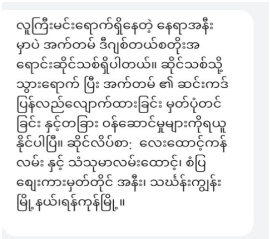

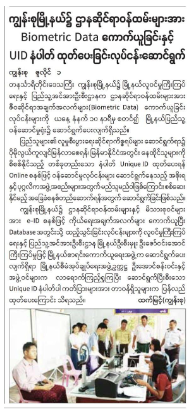

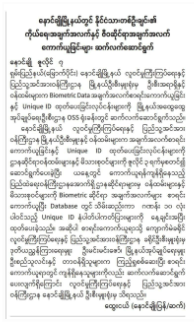
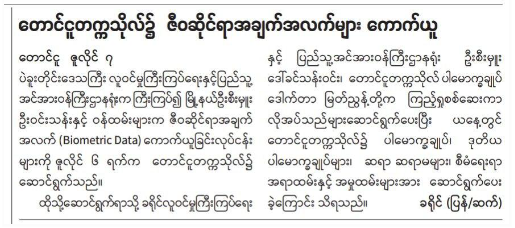

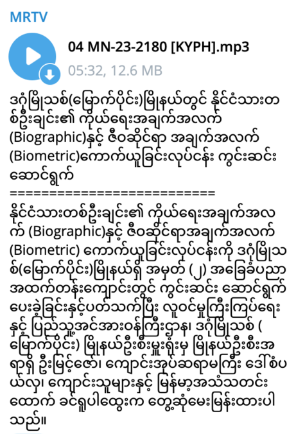



Comments